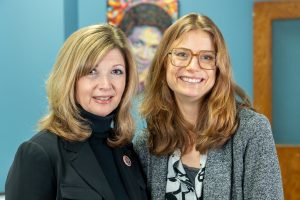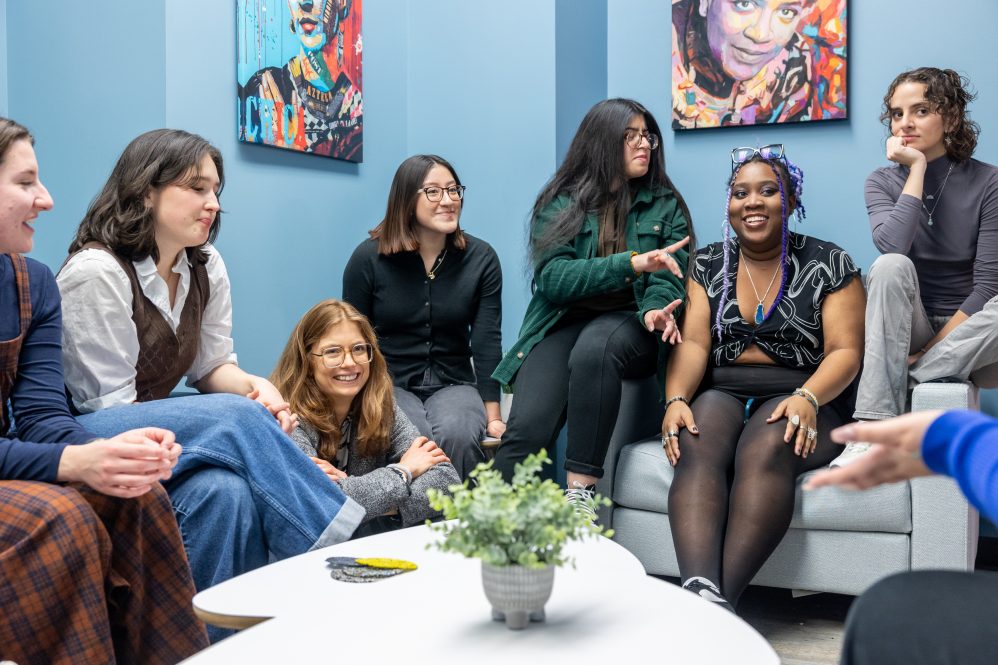The Andrew W. Mellon Foundation, a philanthropic organization dedicated to supporting the arts and humanities, has awarded $100,000 to UConn’s Women, Gender, and Sexuality Studies (WGSS) program as part of its “Affirming Multivocal Humanities” initiative.
WGSS Director Sherry Zane and Associate Director Ariana Codr co-wrote the grant proposal that netted the program its first major external grant.
“One of Higher Learning’s core aims is to elevate humanities knowledge that informs more complete and accurate narratives of the human experience and lays the foundation for more just and equitable futures,” wrote Phillip Brian Harper, program director for Higher Learning at the Mellon Foundation, in the call for grant submissions. “The study of race, gender, and sexuality is crucial to this objective, particularly at this pivotal moment in the history of the United States. Indeed, research and teaching in these fields epitomizes the essential exercise of academic freedom within the US higher education system.”
“We are incredibly grateful to the Mellon Foundation for putting together this call,” says Codr. “The Foundation understands that we’re facing a political, social, and economic moment where this kind of work is being devalued, if not actively attacked. It is crucial that programs like WGSS at UConn be maintained and supported if this basic principle of higher education is to be upheld.”
UConn WGSS, formally established in 1974 as UConn Women’s Studies, is an interdisciplinary program housing faculty from various schools and colleges. Over 40 students are currently majoring in WGSS, while upwards of 150 students have declared minors (placing the program in the top 11 minors offered at the university).
But the program’s reach extends beyond these metrics. Hundreds of UConn students annually enroll in WGSS classes to meet general education requirements, round out courseloads, or satisfy lifelong curiosities about systems of oppression and theories of resistance.
“Even though we are a small program, we do a great service to the university by teaching students how to build a supportive and critical scholarly community that advances our understanding of the construction and reproduction of inequity, as well as resistance to it,” says Zane.
“WGSS students are incredibly dedicated,” says Codr. “They find something in our program that I think is sometimes hard to find elsewhere – a sense of belonging, a sense of purpose, a sense of hope for change. It’s really nice to have a place where this is recognized.”
WGSS course offerings are diverse, ranging from “Gender and Globalization” to “Black Feminist Politics” to “LGBTQ+ Literature.” The program comprises 14 core faculty members and over 50 affiliated faculty.

Academically, it finds a home amongst other justice-oriented programs that sprang up on university campuses in the late twentieth century, like Africana studies, Asian and Asian American studies, and Latinx studies. At UConn as elsewhere, these offerings were brought about by student protest and demand.
Zane says she is particularly excited to use the funding to expand programming in disability studies. This field is currently gaining academic awareness in much the same way as gender, critical race, and ethnic studies did in the 1960s and 70s.
“We are lucky to have two amazing feminist disability scholars in our program — Laura Mauldin and Brenda Brueggemann — who are working on creating a disability studies minor,” Zane says. “Disability is a feminist issue, and our students recognize disability as part of the human experience, not the exception to it.”
More big things are in store for WGSS too, Zane says, like the development of an MA “Plus One” program (which would allow undergraduate students to earn a master’s degree by taking an additional year of courses after receiving their BA), a possible graduate studies partnership with Spelman college, and a WGSS 50th anniversary celebration this coming March (which, in keeping with the program’s tradition, will feature speaker panels and collaborative discussions).
The no-strings-attached funding from the Mellon Foundation will help the program realize all these goals.
“It reaffirms that there is a community of people, both inside academia and outside, who believe in the importance of this work,” says Codr.
Above all, the funding will help the program support more students, as its course offerings and enrollment numbers continue to expand in student-led directions.
Those students “are the beating heart, and they just bring so much,” Codr says. “That’s why we do it.”



